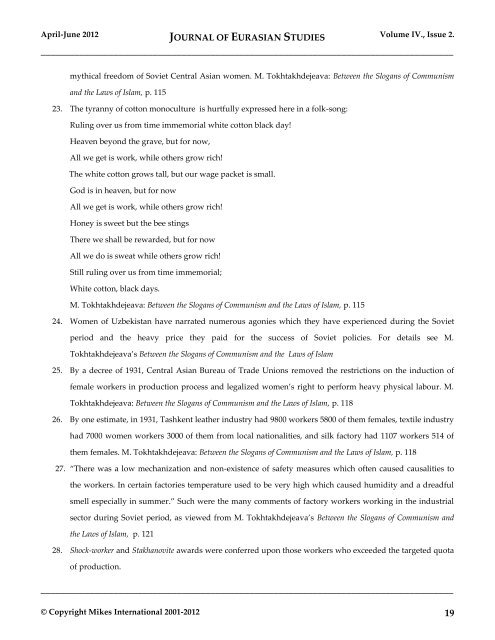You also want an ePaper? Increase the reach of your titles
YUMPU automatically turns print PDFs into web optimized ePapers that Google loves.
April-June 2012 JOURNAL OF EURASIAN STUDIES Volume IV., Issue 2.<br />
_____________________________________________________________________________________<br />
mythical freedom <strong>of</strong> Soviet Central Asian women. M. Tokhtakhdejeava: Between the Slogans <strong>of</strong> Communism<br />
and the Laws <strong>of</strong> Islam, p. 115<br />
23. The tyranny <strong>of</strong> cotton monoculture is hurtfully expressed here in a folk-song:<br />
Ruling over us from time immemorial white cotton black day!<br />
Heaven beyond the grave, but for now,<br />
All we get is work, while others grow rich!<br />
The white cotton grows tall, but our wage packet is small.<br />
God is in heaven, but for now<br />
All we get is work, while others grow rich!<br />
Honey is sweet but the bee stings<br />
There we shall be rewarded, but for now<br />
All we do is sweat while others grow rich!<br />
Still ruling over us from time immemorial;<br />
White cotton, black days.<br />
M. Tokhtakhdejeava: Between the Slogans <strong>of</strong> Communism and the Laws <strong>of</strong> Islam, p. 115<br />
24. Women <strong>of</strong> Uzbekistan have narrated numerous agonies which they have experienced during the Soviet<br />
period and the heavy price they paid for the success <strong>of</strong> Soviet policies. For details see M.<br />
Tokhtakhdejeava’s Between the Slogans <strong>of</strong> Communism and the Laws <strong>of</strong> Islam<br />
25. By a decree <strong>of</strong> 1931, Central Asian Bureau <strong>of</strong> Trade Unions removed the restrictions on the induction <strong>of</strong><br />
female workers in production process and legalized women’s right to perform heavy physical labour. M.<br />
Tokhtakhdejeava: Between the Slogans <strong>of</strong> Communism and the Laws <strong>of</strong> Islam, p. 118<br />
26. By one estimate, in 1931, Tashkent leather industry had 9800 workers 5800 <strong>of</strong> them females, textile industry<br />
had 7000 women workers 3000 <strong>of</strong> them from local nationalities, and silk factory had 1107 workers 514 <strong>of</strong><br />
them females. M. Tokhtakhdejeava: Between the Slogans <strong>of</strong> Communism and the Laws <strong>of</strong> Islam, p. 118<br />
27. “There was a low mechanization and non-existence <strong>of</strong> safety measures which <strong>of</strong>ten caused causalities to<br />
the workers. In certain factories temperature used to be very high which caused humidity and a dreadful<br />
smell especially in summer.” Such were the many comments <strong>of</strong> factory workers working in the industrial<br />
sector during Soviet period, as viewed from M. Tokhtakhdejeava’s Between the Slogans <strong>of</strong> Communism and<br />
the Laws <strong>of</strong> Islam, p. 121<br />
28. Shock-worker and Stakhanovite awards were conferred upon those workers who exceeded the targeted quota<br />
<strong>of</strong> production.<br />
_____________________________________________________________________________________<br />
© Copyright Mikes International 2001-2012 19
















